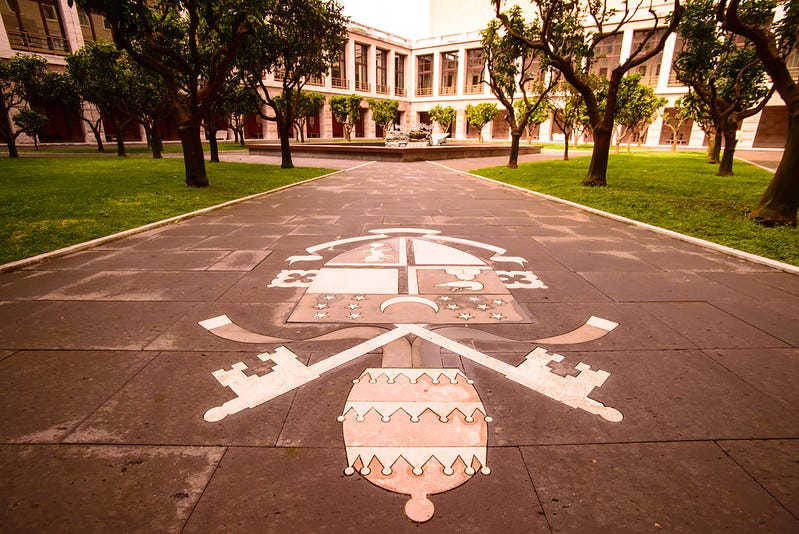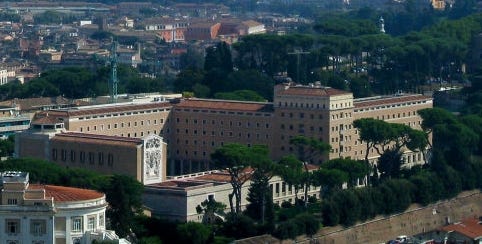

The Vatican’s Congregation for Clergy is consulting U.S. metropolitan archbishops on the appointment of a new rector for the Pontifical North American College. The unusual consultation comes after the seminary’s board of governors and the Vatican congregation were effectively deadlocked last month over candidates for the appointment.
Metropolitans — the 32 archbishops who lead the Church’s U.S. archdioceses — are not typically involved in the appointment of a seminary rector at the NAC, the American seminary in Rome, which is overseen by a board of regionally representative U.S. bishops and the Vatican’s Congregation for Clergy.
Consulting the metropolitans might be seen in Rome as just a convenient way to break up an impasse in the ordinary appointment process. It could also be thought that candidates will be better scrutinized with the involvement of more bishops who are not themselves graduates of the North American College, as most on the board of governors are — indeed, several have also served on the seminary’s faculty.
But some bishops say the move signals a broader shift in ecclesiastical governance procedures, which would see American metropolitan archbishops begin taking up tasks ordinarily handled by delegates elected by, or through, the U.S. bishops’ conference.

The North American College announced Jan. 12 that its rector, Fr. Peter Harman, would stay in office another six months, extending a term of office originally due to conclude in January 2021, and already extended once before. The seminary said last month that Harman would stay in the role “while the appointment of the next rector is finalized” by the Vatican, “in consultation with the college’s board of governors.”
Behind the scenes, there had been disagreement between the NAC’s leadership board and the Congregation for Clergy over the slate of candidates for the position, and sources close to the seminary told The Pillar that Vatican officials would look to consult American cardinals not on the board. Shortly thereafter, The Pillar had confirmed, the American metropolitans were contacted about the appointment.
The congregation has reportedly told some archbishops that the consultation is aiming for more regional representation on the important appointment. But it is not clear exactly why a consultation of metropolitans is needed for a “regionalized” perspective on the North American College, since membership on the board of governors itself is determined by regional election — each of the USCCB’s 15 regions has an elected representative on the board.
That incongruity is among the reasons bishops have told The Pillar that the consultation seems part of a shift towards reliance on metropolitan archbishops for matters of governance, and away from reliance on boards or committee, like the NAC’s board of governors, which are elected committees within the USCCB.
It is clear to Vatican-watchers that some Vatican officials have grown frustrated with the USCCB in recent years, after a tense 2018 intervention on sexual abuse policy, a fracas in January 2021 over the release of a statement on Inauguration Day, and a protracted controversy surrounding the bishops’ 2021 statement, “The Mystery of the Eucharist in the Life of the Church.”
In each of those conflicts, Cardinal Blase Cupich, the Chicago archbishop thought to have considerable influence in the Vatican, has been a central player in whatever tensions between Rome and the USCCB have unfolded.
Cupich has not been shy about his own frustrations with the USCCB. Last year he lamented “internal institutional failures” at the conference, which, he said “must be addressed.”
The cardinal committed to “contributing to all efforts to that end.”
But while the cardinal has pledged to help address the “failures” he sees at the conference, he has also been seen to work around the USCCB at moments of importance.
In January 2021, Cupich raised objections at the Vatican to a planned statement from conference president Archbishop Jose Gomez, which the Vatican intervened to spike, before it was eventually released.
Later that year, Cupich reportedly encouraged the Holy See to intervene in the bishops’ deliberations on a statement on the Eucharist, while at the same time, he helped to organize a letter to Gomez urging that the topic be dropped from the conference agenda. Sixty bishops were initially listed as signers of the letter, although some later said they had not agreed to put their names on it.
And in 2018, after the Vatican intervened to stop a USCCB vote on a proposed sexual abuse policy, Cupich quickly submitted an alternative plan to the bishops, which he had allegedly presented to Vatican officials even before the conference’s own proposal was spiked — although the cardinal said that allegation was false.
The Cupich plan eventually formed the basis for Vos estis lux mundi, the 2019 policy promulgated by Pope Francis.
Some American bishops have told The Pillar they believe that Cupich is also involved in the Congregation for Clergy’s metropolitan consultation on the North American College. The cardinal, they’ve said, has aimed to see metropolitans take up some responsibilities as an alternative to the conference, especially because his place on the Vatican’s Congregation for Bishops gives him influence over the Church’s selection and appointment of those metropolitan archbishops.
If that is the play, the appointment of the NAC’s rector will not likely be the last time that metropolitans find themselves consulted on matters not usually part of their portfolios.
On the other hand, if Cupich is not actually involved in the North American College affair, that perception among a set of U.S. bishops is itself telling — it is clear that among many bishops, there is an understanding that Cupich has the ear of officials in Rome, and is not afraid to make use of that influence.
Of course, it is not yet certain how American archbishops will respond to the Congregation for Clergy’s consultation on the North American College, or even how many are sufficiently familiar with the job candidates to provide useful input.
Nor is it clear whether all the roads that lead to Rome really do go by way of Chicago. But at least among many in the U.S. episcopate, that perception remains an operative consideration.






My guess is that Cupich is going to put his own name in for being rector at the NAC.
It’d be great to get him out of Chicago, and then bishops could just not send their sems to the NAC.
Cardinal Cupich is the prototypical image of power hungry cleric seeking to ensure "his" way and not caring the damage done along the way. The fact he hasn't been made to answer for (or at least called out) to his brother bishops on the fraud of a letter on the Eucharist he tried to push probably makes him feel bulletproof. The very fact someone like him was elevated to the episcopate in the first place is an indictment of the entire process of how bishops are selected, his appointment then probably helped by the fact he's an alumni of the NAC and not for anything he had done as a priest to distinguish his ministry.